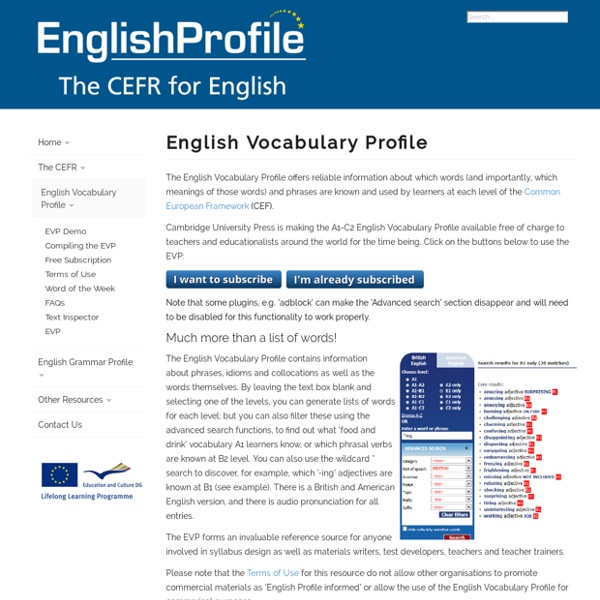Using students' first languages in the classroom
Summary: Using students' first languages in the classroom Whether it is better to use the students' first language (L1) in class or have an English-only policy is something that has been much debated and that has seen many changes of fashion over the years. It seems, therefore, that the only sensible reaction an individual teacher can take to this controversial subject is to neither accept nor reject the use of L1, but simply to search for an ideal level of its use in each individual class- maybe changing its use as the class progresses in level or changes in other ways.
English Profile - English Grammar Profile
The English Grammar Profile allows us to see how learners develop competence in grammatical form and meaning, as well as pragmatic appropriateness, as they move up the CEFR levels. This provides us with typical, world-wide grammar profiles for each level. Like vocabulary, grammatical forms often have more than one meaning. For example, the modal verb 'may' can be used with various meanings at different levels. The EGP teases apart these meanings, and tells us at which level we see learners of English using them correctly and appropriately - here's a sample of the results for 'may': Weak possibility: "The weather may be hot."
Note making : Skills Hub: University of Sussex
Note making Kalim Third year english literature
Readers' guides for reading groups
The Man Booker Prizes offer libraries and reading groups a range of opportunities to get involved with the prize. This is the Readers' guides page with downloadable readers' guides sheets relating to various prizes. Visit the Downloadable resources page for materials for your library, including projector images and posters. The Man Booker Prize is guaranteed to inspire your reading group; whether it's the books that the judges have included or those that they have left out; there is always something for readers to discuss. Our Toolkits, downloadable from the links below, provides a range of ideas that will help your reading group get the most out of the opportunities created by the prize and will help members of your group to feel part of one of the world's most important and prestigious literary prizes. 2019 Man Booker International Prize reader's guides
Reflective teaching: Exploring our own classroom practice
By collecting information about what goes on in our classroom, and by analysing and evaluating this information, we identify and explore our own practices and underlying beliefs. This may then lead to changes and improvements in our teaching. Reflective teaching is therefore a means of professional development which begins in our classroom.
Armistice Runner
Lily has lots of worries. She’s struggling to compete in her junior fell-running races and, worse, she’s losing her gran to Alzheimer’s. But then she discovers her great-great-grandfather’s diaries from the First World War. Could his incredible story of bravery help her reconnect with her gran and even give her the inspiration she needs to push through and win? Written for 9+ children Published by Barrington Stoke Available from your local library, bookshops and “Powerfully poignant, this is a book not to be missed … If there is one WWI story you read this year to commemorate the centenary, let it be this one!”
Action Research - Stop, Start, Continue
I get students to brainstorm all the kind of things I as a teacher do and things which we do in class. Some examples might be: speaking in pairsplaying gamesexplaining grammarsetting homework
D-Day Dog
Jack can’t wait for the school trip to the D-Day landing beaches. It’s his chance to learn more about the war heroes he has always admired – brave men like his dad, who is a reserve soldier. But when his dad is called up to action and things at home spiral out of control, everything Jack believes about war is thrown into question. Finding comfort only in the presence of his loyal dog, Finn, Jack is drawn to the heart-wrenching true story of one particular D-Day paratrooper.
Miscellaneous speaking worksheets
Find someone who…An American English worksheet to ask and answer questions and to complete a chart.Look backAn American English worksheet to play a board game by talking about given topics.What have you been up to?An American English worksheet to speak to as many partners as possible, asking and answering questions using cards as cues.HabitsAn American English worksheet to write about habits and routines and to find people in the class with the same habits and routines.Mix and matchAn American English worksheet to play a board game by matching verbs with other words and expressions.Spot the similaritiesAn American English worksheet to find similarities between two different pictures by asking and answering questions. To write brief descriptions of the pictures.TravelA British English worksheet to put words in the correct order to form questions.
Your Money Matters - Financial Education Textbook - Young Enterprise & Young Money
Minimum Age: 14 Maximum Age: 16 Your Money Matters has been designed for use with young people age 14 – 16 and covers topics including spending and saving, borrowing, debt, insurance, student finance & future planning.
What Students Remember Most About Teachers
Posted 12/02/2014 8:06AM | Last Commented 12/10/2015 4:39PM ©Shuttertstock.com/Monkey Business Images Dear Young Teacher Down the Hall, I saw you as you rushed past me in the lunch room. Urgent. In a hurry to catch a bite before the final bell would ring calling all the students back inside.
My Money Week Resources - Young Enterprise & Young Money
Resources & Activities The 2019 My Money Week resources are now available! We’ve created a brand new set of digital video resources to help your pupils explore a variety of financial decisions.



